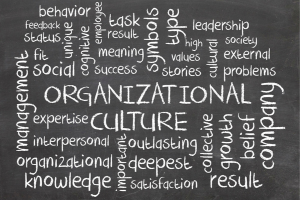 Today’s guest blogger is Rachelle Mire, senior account executive at McQuaig, a global leader in talent management solutions. McQuaig assessments are designed to provide a deeper insight into a candidate’s personality, cognitive, and behavioral attributes. With over 50 years of experience, McQuaig assessments provide a comprehensive view of a candidate and their potential to succeed in a organization while shedding light on the most important areas of employee development. This post discusses the importance of cultural fit within an organization and the role that AI can play in supporting employees.
Today’s guest blogger is Rachelle Mire, senior account executive at McQuaig, a global leader in talent management solutions. McQuaig assessments are designed to provide a deeper insight into a candidate’s personality, cognitive, and behavioral attributes. With over 50 years of experience, McQuaig assessments provide a comprehensive view of a candidate and their potential to succeed in a organization while shedding light on the most important areas of employee development. This post discusses the importance of cultural fit within an organization and the role that AI can play in supporting employees.
In recent years, employers have placed growing importance on cultural fit, which describes the ways in which a candidate is compatible with members of the current team and the overall company culture. Even if a potential hire isn’t a perfect match to the requirements for a role, cultural fit can help hiring teams find a “diamond in the rough”, an employee whose passion for a role and chemistry with their coworkers more than bridges any gaps in their skillset.
The unique personality traits each employee possesses, along with the ways those traits foster collaboration, cooperation, and chemistry among teams, are unique and intangible. And not easily replicated with manufactured systems such as AI, if it’s even possible at all. Therefore, as AI tools grow in importance and prevalence in the modern workplace, cultural fit is highlighted only more prominently.
Artificial Intelligence is rapidly becoming a strong component in numerous industries, and will only grow stronger in the coming months and years. Artificial Intelligence is capable of enhancing training and development practices in an organization, helping employees grow and broaden their skills. If a new team member arrives with any technical shortcomings that may hamper their contribution, AI-powered tools can support them, with learning and productivity tools alike. What AI can’t teach or replace, however, is cultural fit.
How then could your organization maintain focus on hiring for cultural fit? A strong first step is to review your company’s values and culture. Next, take a critical look at your company’s mission and vision statements, along with organizational goals. These will help define the type of employee that would thrive in your company environment. Psychometric assessment tools such as McQuaig can help with this step by inviting different stakeholders and top performers to identify the best qualities for potential cultural and job fit and easily identify clear benchmarks for different job profiles in your organization. When interviewing candidates, allow these insights to inform your questions, making sure you gain a clear picture of their values and work style.
For additional perspective on cultural fit, an organization can involve current employees in the hiring process. Hiring teams can see how they interact with candidates both professionally and socially before committing to a specific prospect. As an added benefit, involving current employees gives them a sense of ownership and engagement in the process, and deepens their commitment to company goals.
Hiring for cultural fit means more than just hiring groups of like-minded individuals, however. There needs to be diversity among teams and across an organization, or else cultural bias can occur. Ironically, this is the same risk associated with allowing AI to influence too many organizational processes. Just as companies need to be more mindful of how they integrate AI tools into their operations, they need to recognize the conscientious application of cultural fit in hiring decisions. They need to look for personality traits that are complementary as well as common to form well-rounded, diverse teams.
Psychometric assessments offer a way to identify these personality traits and better understand whether a candidate will be a cultural fit in the work environment. By measuring soft skills, personality traits, and behavioural tendencies, the assessments provide insight into how a candidate will interact with others and fit within team dynamics. Ultimately, these assessments can help companies avoid the costs and disruption of hiring the wrong person and ensure a more cohesive and productive work environment.
The best candidate for your company will likely possess more than the correct list of technical skills to match the role for which they’re applying. The ideal candidate will also possess that cultural fit, the combination of alignment with your company’s values and philosophy, along with chemistry with existing employees. As powerful as AI may become in the coming years, cultural fit is one thing it can’t teach or replace in successful organizations.